Not sure what material is best for your application?
Contact an Expert
Category Archives: Technical Questions
Q: I’m involved in is currently looking at your non-conductive fasteners to isolate an SMA Connector. But have several questions for finding the right solution regarding torque, preload heating and cooling, and locking features. A: Thanks for all the questions and interest. I will answer all your questions: How is torque … Continue reading
Posted in Application, Engineered Polymer Fasteners, FAQs, Material, Non-Conductive, Technical Questions Tagged Extreme Bolt offers Non-conductive bolts, Extreme Bolt offers Non-conductive fasteners, Extreme Bolt offers Non-conductive screws, non-conductive bolts, non-conductive fasteners, non-conductive screws Leave a comment
Q: Hi, I’m search to get a 1/4″-20 x 3ft long alumina ceramic rod. Is this something you can make? A: For Extreme Bolt & Fastener, 3″ long is the max length we can produce a ceramic bolt, rod or other fastener. As you may know ceramics are brittle, but breakage … Continue reading
Posted in Advanced Ceramic Fasteners, Application, FAQs, High Strength, High Temperature Resistance, Technical Questions Tagged how long can you make a ceramic bolt, How long can you make a ceramic fastener, How long can you make a ceramic screw, How long can you make a zirconia fastener, how long can you make a zirconia screw, How long can you make an alumina bolt, How long can you make an alumina fastener, How long can you make an alumina screw, Remove term: how long can you make a zirconia bol how long can you make a zirconia bolt, what is the max length of a alumina screw, what is the max length of a ceramic bolt, what is the max length of a ceramic rod, What is the max length of a ceramic screw, what is the max length of a zirconia bolt, what is the max length of a zirconia rod, what is the max length of a zirconia screw, what is the max length of an alumina bolt, what is the max length of an alumina rod Leave a comment
Q: A customer is asking for DFAR compliant bolts. Does this mean it is domestic material and does it mean it has to be made in the USA? A: DFAR (Defense Federal Acquisition Regulation Supplement) is a purchasing regulation from the US government, which was created to ensure that the … Continue reading
Posted in FAQs, Technical Questions Tagged 304 stainless dfar bolts, 304 stainless dfar fasteners, 304 stainless dfar screws, 304 stainless steel dfar bolts, 304 stainless steel dfar screws, 304 steel DFAR bolts, 304 steel DFAR scres, 316 DFAR bolts, 316 DFAR compliant bolts, 316 DFAR compliant fasteners, 316 DFAR compliant screws, 316 DFAR screws, 316 Stainless DFAR bolts, 316 stainless DFAR compliant bolts, 316 stainless DFAR compliant fasteners, 316 stainless DFAR compliant screws, 316 stainless DFAR screws, 316 stainless steel dfar bolts, 316 stainless steel dfar fasteners, 316 stainless steel dfar screws, A286 DFAR bolts, A286 DFAR compliant bolts, A286 DFAR compliant fasteners, A286 DFAR compliant screws, A286 DFAR fasteners, A286 DFAR screws, DFAR Bolts, DFAR compliant Bolts, DFAR compliant fasteners, DFAR compliant Screws, DFAR fasteners, DFAR Screws, Monel DFAR bolts, Monel DFAR compliant bolts, Monel DFAR compliant Screws, Monel DFAR screws, Steel DFAR bolts, Steel DFAR compliant Screws, Steel DFAR screws Leave a comment
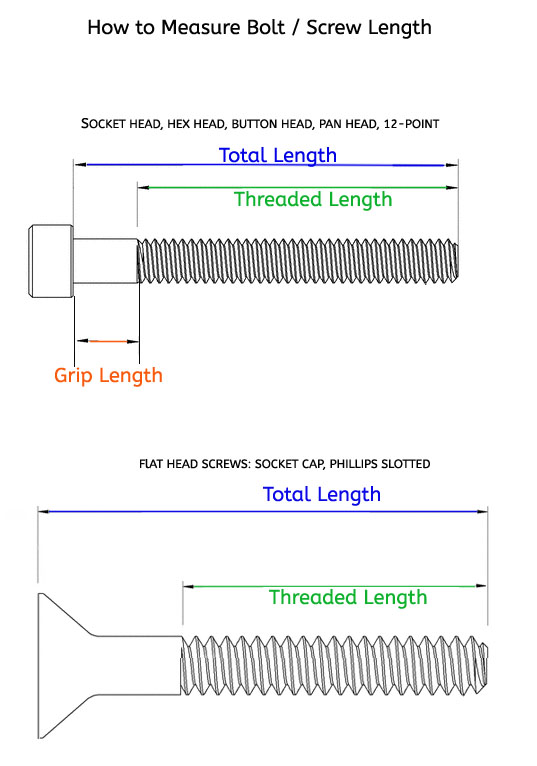 Q: What is bolt grip length vs the threaded length? And which is the total length of the bolt? A: Neither the grip length or threaded length provide information on the overall bolt length. The length of the bolt is always measured from under the head of the bolt to … Continue reading
Q: What is bolt grip length vs the threaded length? And which is the total length of the bolt? A: Neither the grip length or threaded length provide information on the overall bolt length. The length of the bolt is always measured from under the head of the bolt to … Continue reading
Posted in FAQs, Technical Questions Tagged 17-4 bolt failure, Bolt thread lengths, How do you measure the length of a flat head screw, how to measure the length of a flat head screw, the length of a flat head screw, What is bolt grip length, What is grip length, What is the grip length of a bolt, What is the grip length of a screw Leave a comment
Q: I need a non-conductive screw. Can I use Carbon fiber reinforced PEEK? A: NO – The addition of carbon fibers into the polymer will significantly increase the conductivity of the material.
Q: Am I right in understanding that polymer fasteners are chemically resistant? I know they are not nearly as strong or temperature resistant as a metal, but our temperatures are ambient so would this work for me? A: For HCl, you would want to consider PVDF polymer fasteners. These are … Continue reading
Posted in Application, Corrosion Resistance, Engineered Polymer Fasteners, FAQs, Material, Technical Questions Tagged PVDF bolts for HCl, PVDF bolts for hydrochloric acid, PVDF fasteners for corrosion resistance, PVDF fasteners for HCl, PVDF fasteners for hydrochloric acid, PVDF for HCl, PVDF for hydrochloric acid, PVDF for hydrochloric acid corrosion, PVDF screws for corrosion resistance, PVDF screws for HCl, PVDF screws for hydrochloric acid Leave a comment
Q: Which polymer do we offer that would have the smallest compressibility and minimal thermal expansion? We have a very precise laser application. So if the screw changes its dimensions with increasing / decreasing temperatures or loads their device may not be as accurate as it should be. Can you … Continue reading
Q: We require materials with low outgassing (conforming to ASTM-E595) for use in a satellite and I have yet to find a polymer screw that could meet these requirements. Any ideas? A: I checked PEEK in NASA’s material out-gassing database. It looks like it will most likely meet the 1% … Continue reading
Q: I’m looking for polymer that can withstand around 400F for a high temperature sterilization process in a pharmaceutical application. In addition, I also need the polymer to meet FDA and USDA purity standards. Is this possible with Torlon screws. A: Torlon screws are a good high temperature polymer that … Continue reading
Posted in Application, Engineered Polymer Fasteners, FAQs, High Temperature Resistance, Material, Technical Questions, Ultra Purity Tagged PEEK bolts for high purity, PEEK fasteners for high purity, PEEK FDA approved bolts, PEEK FDA approved fasteners, PEEK FDA approved screws, peek high purity bolts, peek high purity fasteners, PEEK high purity screws, PEEK screws for high purity, PEEK USDA approved bolts, PEEK USDA approved fasteners, PEEK USDA approved screws, Torlon bolts for high temperatures, Torlon screws for high temperatures Leave a comment
Q: I’m currently cruising the internet looking for the best way to support a ceiling via suspension from structural steel. We’re building a freezer, and I don’t want thermal bridging from the inside of the freezer up to the structural steel, so a metal rod is pretty much out of … Continue reading
Posted in Application, Engineered Polymer Fasteners, FAQs, High Strength, Material, Non-Conductive, Technical Questions Tagged glass fiber PEEK bolts for high strength, glass fiber PEEK bolts for high strength low thermal conductivity, glass fiber PEEK bolts for low thermal conductivity, glass fiber PEEK fasteners for high strength, glass fiber PEEK fasteners for high strength low thermal conductivity, glass fiber PEEK fasteners for low thermal conductivity, glass fiber PEEK for high strength, glass fiber PEEK screws for high strength, glass fiber PEEK screws for high strength low thermal conductivity, glass fiber PEEK screws for low thermal conductivity, PEEK bolts, PEEK bolts for high strength, PEEK Fasteners, PEEK fasteners for high strength, PEEK for high strength, PEEK Screws, PEEK screws for high strength Leave a comment
Q: We are attaching steel to aluminum in a drainage pond application, and need to prevent electrolysis. The aluminum materials are degrading prematurely. Is there a non-conductive bolt that would work for this situation? A: Your best bet is if you can use a polymer bolt like PEEK. PEEK bolts … Continue reading
Posted in Application, Engineered Polymer Fasteners, FAQs, Material, Non-Conductive, Technical Questions Tagged Non-conductive polymer bolt, Non-conductive polymer bolts, Non-conductive polymer screw, Non-conductive polymer screws, PEEK bolt for non-conductivity, PEEK bolts for non-conductivity, PEEK for galvanic corrosion prevention, PEEK screw for non-conductivity, PEEK screws for non-conductivity Leave a comment
Q: I’m looking for a polymer fastener that can withstand ultraviolet radiation, but is also FDA approved as this is for a pharmaceutical application. Temperatures are around 100C. A: For this application, a good choice would be PVDF fasteners. PVDF screws are both FDA approved and are ideal for handling … Continue reading
Posted in Application, Corrosion Resistance, Engineered Polymer Fasteners, FAQs, High Temperature Resistance, Material, Technical Questions, Ultra Purity Tagged PVDF bolt for ultraviolet radiation, PVDF bolts for ultraviolet radiation, PVDF screw for ultraviolet radiation, PVDF screws for ultraviolet radiation Leave a comment
Q: I have a food processing application that requires a polymer screw that can get hot – about 300F. My concern is outgassing in the heat that can contaminate the food chemicals. Is there something that will not outgas that can work for me? A: For your application I would … Continue reading
Posted in Application, Engineered Polymer Fasteners, FAQs, High Temperature Resistance, Technical Questions, Ultra Purity Tagged Bolt approved by FDA, Bolt approved by USDA, Bolts approved by FDA, Bolts approved by USDA, PEEK bolt 3A Dairy approved, PEEK bolt FDA approved, PEEK bolt for food applications, PEEK bolt USDA approved, PEEK bolts 3A Dairy approved, PEEK bolts FDA approved, PEEK bolts for food applications, PEEK bolts USDA approved, PEEK screw 3A Dairy approved, PEEK screw FDA approved, PEEK screw for food applications, PEEK screw USDA approved, PEEK screws 3A Dairy approved, PEEK Screws FDA approved, PEEK screws for food applications, PEEK screws USDA approved, Screw approved by FDA, Screw approved by USDA, Screws approved by FDA Leave a comment
Q: I want to use A286 fasteners with our product (a force sensor). Will A286 gall with 6Al4V titanium or 15-5 stainless steel or 304 SS helicoils without lubrication. The customer will not allow lubricants. Thank you A: The biggest factor to galling is using similar material on each other. … Continue reading
Q) I have cryogenic liquid hydrogen and hydrogen gas in my process and having a really hard time controlling leaks from flanges. All the gaskets I have used don’t seem last very long before leaking and cannot be tightened any further. Do you have any suggestions for dealing with this … Continue reading
Q: I’m looking for a polymer insert locknut for a marine environment. Can you make any suggestions? A: In your marine lock nut application, the polymer you should consider for the locking mechanism would be PVDF (Kynar). PVDF polymer in combination with the lock nut would perform very well in … Continue reading
Posted in Application, Engineered Polymer Fasteners, FAQs, Material, Non-Conductive, Technical Questions Tagged PVDF Insert Locknut for Marine Application, PVDF Insert Locknut for Salt Water, PVDF Insert Locknut for Saltwater, PVDF Insert Locknut for Sea water, PVDF Insert Locknut for Seawater, PVDF Lock Nut for Marine Application Leave a comment
Q: I cannot obtain an adequate seal with my existing metallic gaskets because my current flange and fastener maximum yield strengths will be exceeded. Any suggestions? A: JP/JG gaskets, with their unique design, offer and low tightening requirement across the surface of the gasket face in order to obtain extremely … Continue reading
Q: Can you suggest a gasket that reduces piping costs and how? A: For high temperature and pressure piping systems, the required clamping pressure or Seating Stress ‘Gb’ of the gasket in order to contain the process media’s measure of Tightness ‘Tp’ at specified levels of process pressure, is dictated … Continue reading
Posted in Application, FAQs, Material, Technical Questions Leave a comment
Q: I need a polymer flange that for a sterilization process. It would need to withstand temps of about 300F. Any suggestions? A: For this situation I would suggest a PEEK flange. PEEK is strong to temps of about 500F and performs excellently in both high temperature steam and water … Continue reading
Posted in Application, Engineered Polymer Fasteners, FAQs, High Temperature Resistance, Material, Technical Questions Tagged PEEK flange for high temperature, PEEK Flange for high temperature sterilization, PEEK flange for radiation sterilization, PEEK Flange for steam sterilization, PEEK flange for sterilization Process, PEEK flanges for 300F Leave a comment
Q: We are looking for a non-conductive screw that gets close to the strength of 316 stainless steel, ideas? A: The best we could offer would be our glass fiber reinforced PEEK screws. It has nearly double the tensile strength as natural PEEK at about 22,800 psi. You could also … Continue reading
Posted in Advanced Ceramic Fasteners, Application, Engineered Polymer Fasteners, FAQs, High Strength, Technical Questions Tagged Glass Fiber Peek bolts electrical insulation, Glass Fiber Peek bolts for non-conductive application, Glass Fiber Peek fasteners electrical insulation, Glass Fiber Peek fasteners for non-conductive application, Glass Fiber Peek screws electrical insulation, Glass Fiber Peek screws for non-conductive application, PEEK bolts for high strength, PEEK fasteners for high strength, PEEK screws for high strength Leave a comment
Q: I’m looking for threaded rods and nuts that would need to be able to withstand a potential exposure to ferric chloride and constant exposure to 3% hydrochloric acid which could reach 31% in a rare instance, would this PEEK withstand these chemicals? A: PEEK fasteners work well with harsh … Continue reading
Posted in Application, Corrosion Resistance, Engineered Polymer Fasteners, FAQs, Technical Questions Tagged PEEK fasteners for hydrochloric acid, PEEK fasteners for hydrochloric acid corrosion resistance, PEEK for hydrochloric acid, PEEK for hydrochloric acid corrosion resistance, PEEK screws for hydrochloric acid, PEEK threaded rod for hydrochloric acid, polymer fasteners for hydrochloric acid, Polymers for hydrochloric acid Leave a comment
Q: I need a polymer fastener that offers the best corrosion resistance at high temperatures. I’m using a low percentage of H2SO4 but temps can get up to 300F. Any ideas? A: The best polymer fastener for high temperature corrosion resistance is PTFE screws. PTFE fasteners offer excellent corrosion resistance … Continue reading
Posted in Application, Corrosion Resistance, Engineered Polymer Fasteners, FAQs, High Temperature Resistance, Material, Technical Questions Tagged PTFE bolts for H2SO4 corrosion, PTFE bolts for high temperature corrosion, PTFE bolts for sulfuric acid corrosion, PTFE fasteners for H2SO4 corrosion, PTFE fasteners for high temperature corrosion, PTFE fasteners for sulfuric acid corrosion, PTFE screws for H2SO4 corrosion, PTFE screws for high temperature corrosion, PTFE screws for sulfuric acid corrosion Leave a comment
Q: Do ceramic fasteners provide strength? A: The answer to your question is both yes and no. They provide decent tensile strength similar to some stainless steels(Aluminia bolts has a tensile strength of 30 ksi and Zirconia screws 75 ksi), however they don’t have any yield strength. Due to the … Continue reading
Posted in Advanced Ceramic Fasteners, Application, FAQs, High Strength, Material, Technical Questions Tagged strength of alumina bolts, strength of alumina fasteners, strength of alumina screws, strength of alunina ceramic bolts, strength of alunina ceramic fasteners, strength of alunina ceramic screws, strength of ceramic bolts, Strength of ceramic fasteners, strength of ceramic screws, strength of zirconia bolts, strength of zirconia ceramic bolts, strength of zirconia ceramic fasteners, strength of zirconia ceramic screws, strength of zirconia fasteners, strength of zirconia screws Leave a comment
Q: I need a polymer fastener that can withstand high temp pharma sterilization processes? There may also be chemical contaminants in the process. A: Depending on the temperatures you are looking at, the three options to consider would be PEEK, PVDF or PTFE fasteners. PEEK fasteners can be used to … Continue reading
Posted in Application, Corrosion Resistance, Engineered Polymer Fasteners, FAQs, High Temperature Resistance, Material, Technical Questions, Ultra Purity Tagged PEEK bolts for sterilization processes, PEEK fasteners for sterilization processes, PEEK screws for sterilization processes, PTFE bolts for sterilization processes, PTFE fasteners for sterilization processes, PTFE screws for sterilization processes, PVDF bolts for sterilization processes, PVDF fasteners for sterilization processes, PVDF screws for sterilization processes Leave a comment
Q: I’m using PEEK fasteners in hydrochloric acid but am seeing a slight bit of corrosion or degradation of the fastener. Can you recommend a better polymer for resistance? A: For corrosion in HCL, a better choice may be PTFE screws. PTFE fasteners are virtually inert to most organics, acids … Continue reading
Posted in Application, Corrosion Resistance, Engineered Polymer Fasteners, FAQs, Material, Technical Questions Tagged PTFE bolts for acid corrosion, PTFE bolts for corrosion, PTFE bolts for hydrochloric acid corrosion, PTFE fasteners for acid corrosion, PTFE fasteners for corrosion, PTFE fasteners for hydrochloric acid corrosion, PTFE screws for acid corrosion, PTFE screws for corrosion, PTFE screws for hydrochloric acid corrosion, PTFE vs PEEK bolts for corrosion, PTFE vs PEEK bolts for hydrochloric acid corrosion, PTFE vs PEEK fasteners for corrosion, PTFE vs PEEK fasteners for hydrochloric acid corrosion, PTFE vs PEEK screws for corrosion, PTFE vs PEEK screws for hydrochloric acid corrosion Leave a comment
Q: I have a high temperature sterilization process and am using PVDF screws. They seem to be weakening under the temperatures that approach 300F. Any suggestions? A: PEEK fasteners may be a good fit for your application. PEEK screws stay strong and retain their mechanical properties to about 500F. They … Continue reading
Posted in Application, Engineered Polymer Fasteners, FAQs, High Temperature Resistance, Material, Technical Questions Tagged PEEK bolts for 300F, PEEK bolts for high temperature sterilization, PEEK bolts for sterilization, Peek fasteners for 300F, PEEK fasteners for high temperature sterilization, PEEK fasteners for sterilization, PEEK screws for 300F, PEEK screws for high temperature sterilization, PEEK screws for sterilization Leave a comment
Q: What would be the highest strength polymer fastener I can use to 400F? A: For this application, probably the best option for you would be PEEK fasteners. PEEK screws are usable to 500F and are available in three levels of strength. Unfilled natural PEEK fasteners offer 16,000 psi tensile … Continue reading
Posted in Application, Engineered Polymer Fasteners, FAQs, High Strength, High Temperature Resistance, Material, Technical Questions Tagged High STrength PEEK bolts, High strength PEEK Fasteners, High strength PEEK screws, PEEK bolts for strength, PEEK fasteners for strength, PEEK screws for strength Leave a comment
Q: What is the max temperature I could expose PEEK screws to HCl? A: This depends on the concentration of the HCl but if you were at about 15%, the PEEK fasteners can be exposed to about 100C of hydrochloric acid solution. See this chart https://www.extreme-bolt.com/peek-fasteners-flanges.html#Chemical. That is the max … Continue reading
Posted in Application, Corrosion Resistance, Engineered Polymer Fasteners, FAQs, High Strength, High Temperature Resistance, Technical Questions Tagged Exposing PEEK bolts to HCL, Exposing peek bolts to hydrochloric acid, Exposing Peek fasteners to HCl, Exposing PEEK fasteners to Hydrochloric acid, Exposing PEEK Screws to HCl, Exposing PEEK screws to hydrochloric acid, max temperature I could expose PEEK bolts to HCl, max temperature I could expose PEEK fasteners to HCl, max temperature I could expose PEEK fasteners to Hydrochloric acid, max temperature I could expose PEEK screws to HCl, max temperature I could expose PEEK screws to hydrochloric acid Leave a comment
Q: We are looking for high shear strength non-conductive flat head screws being used for electrical insulation. The screws need to have a high shear strength quality as other plastics screws we have tried have broken. Do you have a material you can recommend? A: With regards to a polymer … Continue reading
Posted in Application, Engineered Polymer Fasteners, FAQs, High Strength, Material, Non-Conductive, Technical Questions Tagged Glass Fiber Peek bolts electrical insulation, Glass Fiber Peek bolts for high strength insulation, Glass Fiber Peek fasteners electrical insulation, Glass Fiber Peek fasteners for high strength insulation, Glass Fiber Peek screws electrical insulation, Glass Fiber Peek screws for high strength insulation, Glass Fiber Reinforced Peek bolts electrical insulation, Glass Fiber Reinforced Peek bolts for high strength insulation, Glass Fiber Reinforced Peek fasteners electrical insulation, Glass Fiber Reinforced Peek fasteners for high strength insulation, Glass Fiber Reinforced Peek for high strength insulation, Glass Fiber Reinforced Peek screws electrical insulation, Glass Fiber Reinforced Peek screws for high strength insulation, Glass Reinforced Peek bolts for high strength insulation, Glass Reinforced Peek fasteners for high strength insulation, Glass Reinforced Peek for high strength insulation, Glass Reinforced Peek screws for high strength insulation Leave a comment
Q: I’m looking for a polymer that can be exposed to low concentration of sulfuric acid. Which polymer do you recommend? I tried PTFE but they don’t seem to be as strong as I need. A: PTFE and PFA fasteners offer the highest polymer corrosion resistance but the trade-off is … Continue reading
Posted in Application, Corrosion Resistance, Engineered Polymer Fasteners, FAQs, High Strength, Technical Questions Tagged polymer bolts for sulfuric acid, polymer fasteners for sulfuric acid, polymer screws for sulfuric acid, PVDF bolts for sulfuric acid, PVDF bolts for sulfuric acid corrosion resistance, PVDF fasteners for corrosion resistance, PVDF fasteners for sulfuric acid, PVDF fasteners for sulfuric acid corrosion resistance, PVDF screws for sulfuric acid, PVDF screws for sulfuric acid corrosion resistance Leave a comment
Q: I need a fastener that can withstand frequent sterilization processes at temps to around 400F. I would prefer a polymer if possible. Also the process is pharma related, so the screws would need to be non leaching and may be exposed to low concentrations of chemicals. Any ideas? A: … Continue reading
Posted in Application, Engineered Polymer Fasteners, FAQs, High Temperature Resistance, Material, Technical Questions, Ultra Purity Tagged FDA approved bolts, FDA approved fasteners, FDA approved peek bolts, FDA approved PEEK fasteners, FDA approved PEEK screws, FDA approved screws, Hydrolysis resistant bolts, Hydrolysis resistant fasteners, Hydrolysis resistant PEEK bolts, Hydrolysis resistant PEEK fasteners, Hydrolysis resistant PEEK screws, Hydrolysis resistant screws, PEEK bolts FDA approved, PEEK bolts for Pharmaceutical purity, PEEK bolts for purity, PEEK bolts for sterilization processes, PEEK fasteners FDA approved, PEEK fasteners for Pharmaceutical purity, PEEK fasteners for purity, PEEK fasteners for sterilization processes, PEEK Screws FDA approved, PEEK screws for Pharmaceutical purity, PEEK screws for purity, PEEK screws for sterilization processes Leave a comment
Q: Hello I am researching titanium and C276 hardware for a submerged application in a high chloride (20,000 mg/L) elevated temperature environment (125F). Corrosion resistance is more important than shear or tensile strength in this application. A: Titanium screws should be a good choice for your application especially Grade 2 … Continue reading
Posted in Application, Corrosion Resistance, FAQs, High Strength, Technical Questions Tagged Hastelloy bolts for chloride and HCL corrosion, Hastelloy C276 bolts for chloride and HCL corrosion, Hastelloy C276 fasteners for chloride and HCL corrosion, Hastelloy C276 screws for chloride and HCL corrosion, Hastelloy fasteners for chloride and HCL corrosion, Hastelloy screws for chloride and HCL corrosion, Titanium bolts for chloride corrosion, Titanium fasteners for chloride corrosion, Titanium grade 2 bolts for chloride corrosion, Titanium grade 2 fasteners for chloride corrosion, Titanium grade 2 screws for chloride corrosion, Titanium screws for chloride corrosion Leave a comment
Q: I am looking for recommendations for fasteners capable of operating under load at 2000C, in a mild vacuum environment. The material can be conductive or insulating just along as it does not react with carbon. A: For temperatures as high as 2000C, Zirconia ceramic fasteners would be your only … Continue reading
Posted in Advanced Ceramic Fasteners, Application, Corrosion Resistance, FAQs, High Temperature Resistance, Technical Questions Tagged zirconia bolts for high temperature, zirconia ceramic bolts for 2000C application, zirconia ceramic bolts for high temperature, zirconia ceramic fasteners for 2000C application, zirconia ceramic fasteners for high temperature, zirconia ceramic screws for 2000C application, zirconia ceramic screws for high temperature, zirconia fasteners for 2000C application, zirconia fasteners for high temperature, zirconia screws for 2000C application, zirconia screws for high temperature Leave a comment
Q: I have an application with high temperature exhaust that requires a high strength bolt for oxidation resistance. Temps are pretty consistent around 1300F. Would Inconel 718 bolts be a good choice? A: Inconel 718 would definitely be one good option. Inconel 718 bolts offer 210ksi tensile strength and are … Continue reading
Posted in Application, FAQs, High Strength, High Temperature Resistance, Technical Questions Tagged A286 bolts for high temperatures, A286 fasteners for high temperatures, A286 screws for high temperatures, Alloy 718 bolts for high temperatures, Alloy 718 fasteners for high temperatures, Alloy 718 screws for high temperatures, Inconel 718 bolts for high temperatures, Inconel 718 fasteners for high temperatures, Inconel 718 screws for high temperatures, Nimonic 80A bolts for high temperatures, Nimonic 80A fasteners for high temperatures, Nimonic 80A screws for high temperatures, Nimonic bolts for extreme temperatures, Nimonic bolts for high temperatures, Nimonic fasteners for extreme temperatures, Nimonic fasteners for high temperatures, Nimonic screws for extreme temperatures, Nimonic screws for high temperatures Leave a comment
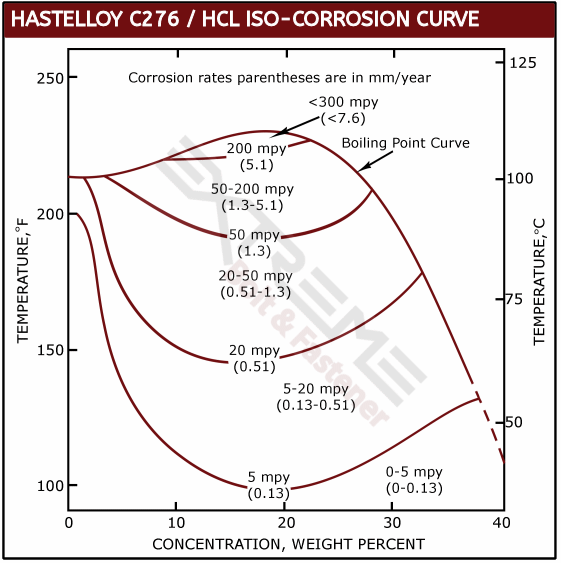 Q: I am needing to replace some hex heads and nuts on an HCL tank lid. It appears they were originally coated and due to a previous leak, they are starting to corrode. What would be the best alternative bolt type for this situation? HCL concentration is 37% and is … Continue reading
Q: I am needing to replace some hex heads and nuts on an HCL tank lid. It appears they were originally coated and due to a previous leak, they are starting to corrode. What would be the best alternative bolt type for this situation? HCL concentration is 37% and is … Continue reading
Posted in Application, Corrosion Resistance, FAQs, Material, Technical Questions Tagged Hastelloy bolts for HCl corrosion, Hastelloy bolts for hydrochloric acid corrosion, Hastelloy C276 bolts for HCl corrosion, Hastelloy C276 fasteners for HCl corrosion, Hastelloy C276 screws for HCl corrosion, Hastelloy FAsteners for HCl corrosion, hastelloy fasteners for hydrochloric acid corrosion, hastelloy screws for HCl corrosion, hastelloy screws for hydrochloric acid corrosion Leave a comment
Q: We are looking for a non-conductive screw with lower dielectric constant / dissipation factor to replace a steel screw (Tensile Strength 70kpsi) in one of our products. So were trying to get to similar strength / properties to the steel screw to meet our torque requirements. Will a ceramic … Continue reading
Posted in Advanced Ceramic Fasteners, Application, Engineered Polymer Fasteners, FAQs, Non-Conductive, Technical Questions Tagged alumina screws for Low Dielectric Constant, ceramic screws for Low Dielectric Constant, PEEK bolts for Low Dielectric Constant, PEEK fasteners for Low Dielectric Constant, PEEK glass filled bolts for Low Dielectric Constant, PEEK glass filled fasteners for Low Dielectric Constant, PEEK glass filled screws for Low Dielectric Constant, PEEK screws for Low Dielectric Constant, zirconia screws for Low Dielectric Constant Leave a comment
Q: I need a material that is resistant to a small concentration of hydrofluoric acid at room temperature? Can you offer any suggestions? A: Two materials come to mind. First in terms of metal alloys Monel 400 bolts are resistant to most concentrations of hydrofluoric acid. If you prefer a … Continue reading
Posted in Application, Corrosion Resistance, Engineered Polymer Fasteners, FAQs, Material, Technical Questions Tagged Monel 400 bolts for hydrofluoric acid corrosion, Monel 400 fasteners for hydrofluoric acid corrosion, Monel 400 screws for hydrofluoric acid corrosion, Monel bolts for hydrofluoric acid corrosion, Monel fasteners for hydrofluoric acid corrosion, Monel screws for hydrofluoric acid corrosion, PTFE bolts for hydrofluoric acid corrosion, PTFE fasteners for hydrofluoric acid corrosion, PTFE screws for hydrofluoric acid corrosion Leave a comment
Q: We are having some issues with corrosion in a highly sensitive pharma application. I need a bolt that is corrosion resistant to both acids and organics, but is usable in a high purity situation. Temperatures can reach about 120F. Also, it would need to be a polymer screw available … Continue reading
Posted in Application, Corrosion Resistance, Engineered Polymer Fasteners, FAQs, Technical Questions, Ultra Purity Tagged polymer fasteners for FDA application, polymer fasteners for pharmaceutical, polymer screws for corrosion, polymer screws for FDA, polymer screws for pharmaceutical, polymer screws for USDA application, PTFE fasteners for corrosion, PTFE fasteners for FDA application, PTFE fasteners for USDA application, PTFE screws for corrosion, PTFE screws for FDA application, ptfe screws for USDA application, PVDF fasteners for corrosion, PVDF fasteners for FDA, PVDF fasteners for high purity, PVDF for high purity, PVDF screws for corrosion, pvdf screws for FDA, PVDF screws for high purity, pvdf screws for USDA application Leave a comment
Q: How do ceramic alumina screws compare to steel screws as far as strength goes? The load would most likely be tension, but some compression too. A: If you compare 316 Stainless Steel to Zirconia ceramic screws, their tensile strengths are similar (around 75 ksi tensile) with Alumina ceramics being … Continue reading
Posted in Advanced Ceramic Fasteners, Application, FAQs, High Strength, Technical Questions Tagged alumina ceramic screw strength, alumina screws compared to stainless steel, Ceramics screws compared to stainless steel, strength of alumina ceramic screws compared to stainless steel, strength of zironia ceramic screws compared to stainless steel, zirconia ceramic screw strength, zirconia screws compared to stainless steel Leave a comment
A. We need a screw that is usable at 200C in air only, so no chemical resistance needed. I like the high strength of the Carbon Fiber PEKK or PEEK Extreme. Will these work?A Q: Would recommend using either Glass filled PEEK or Vespel. Vespel screws are made from the … Continue reading
Posted in Application, Engineered Polymer Fasteners, FAQs, High Temperature Resistance, Technical Questions Tagged glass filled peek for high temperatures, glass filled peek screws for high temperature strength, glass filled peek screws for strength, Polyimide fasteners for high temperature, Polyimide screws for high temperature, Vespel fasteners for high temperature, vespel screws for high temperature Leave a comment
Q: Looking to change to a non-conductive material for use in a high impact application. Would Alumina or Zirconia ceramic fasteners be a good fit? A: We could certainly quote you some ceramic hardware, however ceramics may not be the best non-conductive choice for a high impact environment. Ceramic fasteners … Continue reading
Posted in Application, FAQs, High Strength, Non-Conductive, Technical Questions Tagged non-conductive fasteners, non-conductive polymer fasteners, PEEK bolts for non-conductive applications, PEEK bolts for non-conductivity, PEEK fasteners for non-conductive applications, PEEK fasteners for non-conductivity, PEEK screws for non-conductive applications, PEEK screws for non-conductivity Leave a comment
Q: I have a need for a fastener for cyrogenic Helium (3.5K) application. Ideally, the fastener would be non conductive (electrically). Are any of the non conductive options you have listed good for cryo use? A: You might want to consider PTFE of PEEK fasteners. These are polymers that will … Continue reading
Posted in Application, Engineered Polymer Fasteners, FAQs, Material, Non-Conductive, Technical Questions Tagged cryogenic polymer fasteners, cryogenic polymer screws, cyrogenic polymer bolts, peek bolts for cryogenic, peek fasteners for cryogenic, peek screws for cyrogenic, ptfe bolts for cryogenic, ptfe fasteners for cryogenic, ptfe screws for cryogenic Leave a comment
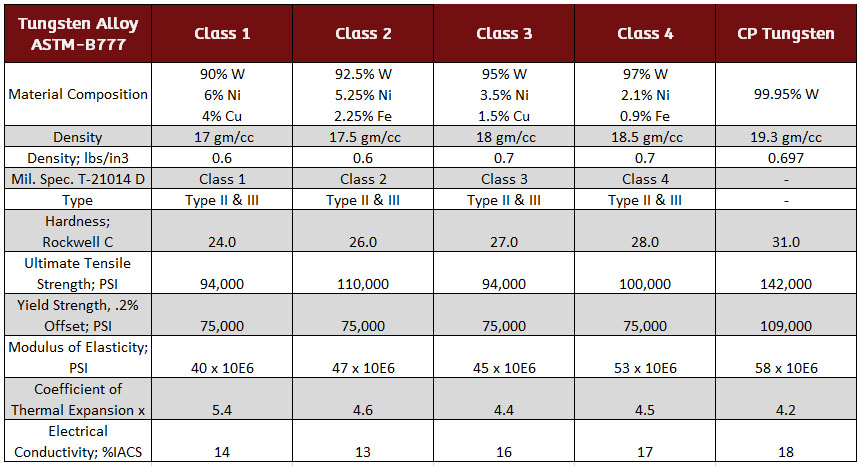 Q: I see that you list 5 different grades of Tungsten on your site, would you maybe help me choose which is the best for my application? A: There are two important differences. First, pure tungsten screws are stronger. For example 99.95% tungsten offers 142 ksi UTS vs Class 1 … Continue reading
Q: I see that you list 5 different grades of Tungsten on your site, would you maybe help me choose which is the best for my application? A: There are two important differences. First, pure tungsten screws are stronger. For example 99.95% tungsten offers 142 ksi UTS vs Class 1 … Continue reading
Posted in Application, FAQs, High Strength, Technical Questions Tagged difference between pure tungsten and alloyed tungsten, pure tungsten fasteners, pure tungsten screws, tungsten alloy fasteners, tungsten alloy screws, tungsten fasteners, tungsten fasteners for strength, tungsten screws, tungsten screws for strength Leave a comment
Q: I need a bolt that can handle high temperatures and be an electric insulator? What can I use? A: That depends on what you mean by high temperature and what other issues you have like the strength requirements. If you are talking about temperatures under 500F, then you may … Continue reading
Posted in Advanced Ceramic Fasteners, Application, Engineered Polymer Fasteners, FAQs, Non-Conductive, Technical Questions Tagged Alumina fastener electric insulation, Alumina fasteners for electric insulation, Alumina screw electric insulation, Alumina screws for electric insulation, Ceramic fastener electric insulation, Ceramic screw electric insulation, PEEK bolts for electric insulation, PEEK fastener electric insulation, PEEK fasteners for electric insulation, PEEK screw electric insulation, PEEK screws for electric insulation Leave a comment
Q: I’m looking for a socket head cap screw that is 5/8″-11 x 5.5 inches in length. Need the material to be non-conductive and was thinking Ceramic Zirconia? Would that work? A: Ceramics like Zirconia screws are in fact an excellent insulator from electrical current. However zirconia ceramic fasteners are … Continue reading
Posted in Advanced Ceramic Fasteners, Engineered Polymer Fasteners, FAQs, Non-Conductive, Technical Questions Tagged ceramic bolts for electric insulation, ceramic fasteners for electric insulation, ceramic screws for electric insulation, PEEK bolts for electric insulation, PEEK fasteners for electric insulation, PEEK fasteners for insulation, PEEK screws for electric insulation, PEEK screws for insulation, zirconia bolts for electric insulation, zirconia bolts for insulation, zirconia ceramic bolts for electric insulation, zirconia ceramic fasteners for electric insulation, zirconia ceramic screws for electric insulation, zirconia fasteners for electric insulation, zirconia fasteners for insulation, zirconia screws for electric insulation, zirconia screws for insulation Leave a comment
Q: I’m looking for a polymer washer that can be used as a dielectric break between aluminum and titanium. It will also be exposed to salt water. Is torlon a good choice? A: Torlon washers will work in this situation, but there are probably more cost efficient solution for this … Continue reading
Posted in Corrosion Resistance, Engineered Polymer Fasteners, FAQs, High Temperature Resistance, Technical Questions Tagged PEEK fasteners for salt water resistance, PEEK fastners for dielectric strength, PEEK for salt water resistance, PEEK screws for dielectric strength, PEEK screws for salt water resistance, PEEK washers for dielectric strength, PEEK washers for salt water resistance, Torlon bolts for dielectric strength, Torlon fasteners for high temperature appliations, Torlon fastners for dielectric strength, Torlon screws for dielectric strength, Torlon screws for high temperature appliations, Torlon washers for dielectric strength, Torlon washers for high temperature appliations Leave a comment
Q: Since Monel is resistant to NaCl does that mean it can handle a strong chloride situation? A: Monel is resistant to chlorides but, for strong chlorides your best bet is to use Titanium screws. Titanium fasteners are almost inert to all chlorine and chloride environments due to the fact … Continue reading
Posted in Corrosion Resistance, FAQs, Material, Technical Questions Tagged titanium bolts and chloride corrosion, Titanium bolts chloride corrosion, Titanium bolts chlorine corrosion, Titanium bolts for chloride corrosion, Titanium bolts for chloride resistance, titanium fasteners and chloride corrosion, Titanium fasteners chloride corrosion, Titanium fasteners chlorine corrosion, Titanium fasteners for chloride corrosion, Titanium fasteners for chloride resistance, titanium screws and chloride corrosion, Titanium screws chloride corrosion, Titanium screws chlorine corrosion, Titanium screws for chloride corrosion, Titanium screws for chloride resistance Leave a comment
Q: I have a laboratory applications that uses about 25% sulfuric acid at room temperature to 100F. I’d like to use a polymer rather than a metal if possible. I tried PTFE screws because I thought they were corrosion resistant, but they need to be replaced often because they can’t … Continue reading
Posted in Corrosion Resistance, Engineered Polymer Fasteners, FAQs, High Temperature Resistance, Technical Questions Tagged PTFE bolts for corrosion resistance, PTFE bolts for sulfuric acid, PTFE fasteners for sulfuric acid, PTFE screws for corrosion resistance, PTFE screws for sulfuric acid, PVDF bolts for corrosion resistance, PVDF bolts for sulfuric acid, PVDF fasteners for corrosion resistance, PVDF fasteners for sulfuric acid, PVDF screws for corrosion resistance, PVDF screws for sulfuric acid Leave a comment
Q: I’m working with a process that requires a constant operating temperature of 450F. Do I need to use a metal screw or is there a polymer that can handle this? A: There are definitely polymers that can handle an environment of 450F. One option is a PEEK fastener. PEEK … Continue reading
Posted in Application, Engineered Polymer Fasteners, FAQs, High Temperature Resistance, Material, Technical Questions Tagged high temperature plastic fasteners, high temperature plastic screws, high temperature polymer fasteners, high temperature polymer screws, PEEK fasteners for high temperature, PEEK high temperature screws, PEEK screws for high temperatures, PEEK verse vespel for high temperatures, Plastic fasteners for high temperature, Plastic screws for high temperatures, Polymer fasteners for high temperature, Polymer screws for high temperature, Vespel fasteners for high temperature, Vespel screws for high temperatures, Vespel vs PEEK for high temperatures Leave a comment
I’m running some laboratory testing in a mixed acid environment and would like to use a corrosion resistant polymer as apposed to a metal. I’ve tried PEEK screws but am still struggling a bit with some acids. Is there anything better? PEEK screws provide reasonable corrosion resistance to most acids … Continue reading
Posted in Application, Corrosion Resistance, Engineered Polymer Fasteners, FAQs, Technical Questions Tagged FDA approved polymer fasteners, polymer corrosion resistant fasteners, polymer screws for acid resistance, PTFE acid resistant fasteners, PTFE acid resistant screws, PTFE corrosion resistant fasteners, PTFE corrosion resistant screws, PTFE fasteners for acid resistance, PTFE fasteners for corrosion, PTFE for corrosion, PTFE screws for acid resistance, screws for laboratory acids Leave a comment
Q: I have an application where I need a non-metal fastener because of insulation and magnetic issues. The problem is that it also needs to be able to retain strength at about 520°F. Should I use a ceramic? A: Ceramic fasteners are definitely not necessary at these temperatures, although they … Continue reading
Posted in Application, Engineered Polymer Fasteners, FAQs, High Temperature Resistance, Material, Non-Conductive, Technical Questions Tagged Torlon fasteners, Torlon fasteners for high strength, torlon fasteners for high temperature, torlon fasteners insulating properties, Torlon for high strength, torlon polymer fasteners, torlon polymer screws, Torlon Screws, Torlon screws for high strength, torlon screws for high temperture, torlon screws insulating properties Leave a comment
Q: I need a fastener that is very low weight and offers good wear resistance for a robotics application. I need about 40 ksi in strength. A: For your application I would actually suggest an engineered polymer fasteners since your strength requirement isn’t high enough to necessitate a metal . … Continue reading
Posted in Application, Engineered Polymer Fasteners, FAQs, High Temperature Resistance, Lightweight, Material, Technical Questions Tagged Fasteners for lightweight, High strength polymer fasteners, high strength polymer screws, PEEK Carbon Fiber Fastener, PEEK fastener, PEEK FAsteners for robotics, PEEK reinforced fastener, PEEK screws for lightweight, PEEK screws for Robotics, Screws for lightweight Leave a comment
Q: I am looking for some high tensile strength studs with good electricity resistance. I think zirconia of aluminia material will be suitable but I am open for suggestions. The studs would be about 5 inches long. A: Probably ceramics fasteners are not the best choice for this situation. It … Continue reading
Posted in Advanced Ceramic Fasteners, Application, Engineered Polymer Fasteners, FAQs, High Strength, Non-Conductive, Technical Questions Tagged non-conductive bolts, non-conductive ceramic fasteners, non-conductive fasterns, non-conductive PEEK fasteners, non-conductive polymer fasteners, non-conductive screws Leave a comment
Q: I have a question regarding a type of fastener that can handle sterilization. What I need is a polymer if possible that can handle both steam and radiation sterilization processes, but doesn’t leach into my process. Contamination is an issue. A: You can definitely use a polymer for this … Continue reading
Posted in Application, Corrosion Resistance, Engineered Polymer Fasteners, FAQs, High Temperature Resistance, Technical Questions, Ultra Purity Tagged Hydrolysis resistance, PEEK, PEEK Screws, PTFE fastener, radiation resistance, steam resistance, Sterilization process, Sterlization resistance Leave a comment
Q: I’m designing laboratory equipment that will be utilized at 325-400F and I need screws that have immunity to organics and low concentrations of acids, as well be FDA approved. Would that be a ceramic? A: You probably don’t want a ceramic screw. Though they are corrosion resistant and offer … Continue reading
Q: I am looking for a suitable fastener for use in a high heat furnace that is running at 2000F but the actual hearth wear flames go up to 3000F. The furnace is not under vacuum and has a normal atmosphere. We are finding that the 304 bolts are failing … Continue reading
Q: I’m building some lab equipment what will be housing hydrochloric acid. I need a non-metal fastener that is corrosion resistant . Can you make a recommendation? A: In terms of a material that is not metallic and can handle hydrochloric acid, I would suggest either PTFE or PVDF. PTFE … Continue reading
Q: I have an application where I need pan head, insulating, high vacuum compatible, screw. It will also need to be usable at a service temperature up to 150C. Do I need a ceramic? A: Though ceramics are excellent insulators, they are usually only used for high temperature applications, where … Continue reading
Posted in Advanced Ceramic Fasteners, Application, Engineered Polymer Fasteners, FAQs, Non-Conductive, Technical Questions Tagged Alumina, Insulator, PEEK, PVDF, vacuum Leave a comment
Q: I’m looking for a chemically resistant polymer that can withstand chlorine and chlorine dioxide as well as a decent amount of weight and tension (around 27 lbs of weigh). Can you suggest a material? A: Of course it depends on the concentrations and temperatures you are operating at but generally … Continue reading
Q: How does creep occur and what polymer is best to prevent this? A: Creep is the permanent deformation of the material caused by constant load or stress, usually accompanied by constant high temperature. This can result in permanent changes of the fastener shape as well weakening and fracturing of the … Continue reading
Posted in Engineered Polymer Fasteners, FAQs, High Strength, Technical Questions Tagged creep resistant, PEEK, polymers screws Leave a comment
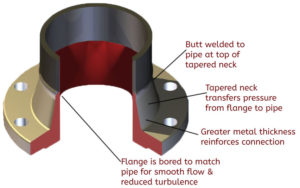 Q: I have a high pressure application with HCl at fluctuating temperatures. Can you recommend the best flange to provide a safe secure joint? A: Hands down, the weld neck flange is best for these types of hazardous, high pressure applications. Weld neck flanges are easily identified by their long … Continue reading
Q: I have a high pressure application with HCl at fluctuating temperatures. Can you recommend the best flange to provide a safe secure joint? A: Hands down, the weld neck flange is best for these types of hazardous, high pressure applications. Weld neck flanges are easily identified by their long … Continue reading
Q: Why does Zirconia cost more than Alumina? A: 1) Raw material cost: Aluminia is far more abundant, whereas Yttrium oxide which is a stabilizer for Zirconia ceramic, is a rare earth element. 2) Shaping costs: Due to its higher density it takes approximately 10x longer to grind down and shape … Continue reading
Q: What advantages does Zirconia have over Alumina? A: Usually for most high temperature or electric insulator applications where ceramics are needed, alumina ceramic fasteners are the most popular choice due to their properties and relatively affordable price compared to zirconia fasteners. However sometimes the extreme properties of zirconia fasteners … Continue reading
Q: Need to replace a standard steel washer with a non-conductive material. A: After speaking with this customer, I learned that he needed to replace a standard steel washer with a non-conductive material for a critical bolted joint. These washers needed to withstand 70°C temperatures while maintaining preload. He … Continue reading
Q: Can you provide alternative for a nylon pan head screw? A: Here the customer needed an alternative to nylon. Resistance to electrical fields was a primary concern. In addition, he also needed a material that had a better dissipation factor than nylon. In this situation we would recommend PEEK. It … Continue reading
Q: Need help with specific needs regarding Polyimide fasteners and their high temperature capabilities A: This Italian company was developing a new client oven. They were interested in Polyimide fasteners and their high temperature capabilities. In particular they needed: Usability to 300°C Capability with metal connections Heat and electric … Continue reading
Q: Why does Zirconia cost more than Alumina? A: 1.) Raw material cost. Alumina is far more abundant, whereas Yttrium oxide which is a stabilizer for Zirconia ceramic, is a rare earth element. 2.) Shaping costs. Due to its higher density it takes approximately 10x longer to grind down … Continue reading
Posted in Advanced Ceramic Fasteners, FAQs, High Temperature Resistance, Technical Questions Tagged Alumina, Zirconia Leave a comment
Q: Polyimide / Vespel fasteners and their high temperature capabilities A: This client is developing a new oven application and was interested in Polyimide fasteners and their high temperature capabilities. In particular they needed:

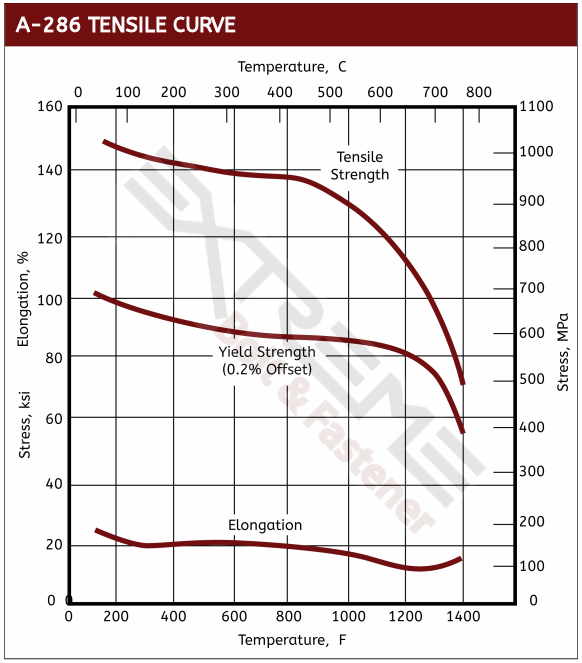 Q: I am designing an engine unit and am considering using 1.4980 stud bolts and nuts at elevated temperature. What is the maximum working temperature for stud bolts made of 1.4980 (A-286)? A: A286/Alloy 660 or 1.4980 fasteners are made of a stainless steel alloy which contains iron, nickel, and …
Q: I am designing an engine unit and am considering using 1.4980 stud bolts and nuts at elevated temperature. What is the maximum working temperature for stud bolts made of 1.4980 (A-286)? A: A286/Alloy 660 or 1.4980 fasteners are made of a stainless steel alloy which contains iron, nickel, and … 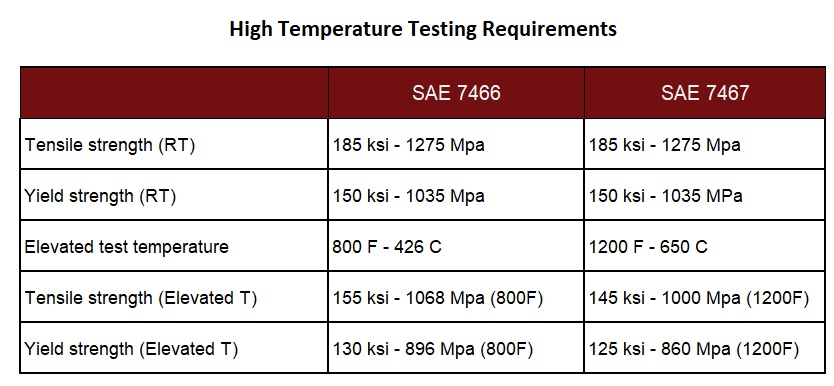 Q: What is the difference between bolting to SAE AS7466 and SAE AS7467? A: Both SAE AS7466 and SAE AS7467 describe bolts and screws made from Inconel 718 (UNS N07718) material equivalent to the European 2.4668 material norm. The main difference between these two specifications is the testing requirements. The Inconel bolt material …
Q: What is the difference between bolting to SAE AS7466 and SAE AS7467? A: Both SAE AS7466 and SAE AS7467 describe bolts and screws made from Inconel 718 (UNS N07718) material equivalent to the European 2.4668 material norm. The main difference between these two specifications is the testing requirements. The Inconel bolt material …  Q: What is the corrosion (oxidation) resistance of 1.4980 (A-286) fasteners compared to 1.4404 (A4 / 316L ) fasteners? A: A286 / 1.4980 bolts provide excellent oxidation resistance up to 1500°F (815°C). This makes 1.4980 bolts ideal for high temperature exhaust streams. In comparison, 316L / 1.4404 bolts can typically be applied up …
Q: What is the corrosion (oxidation) resistance of 1.4980 (A-286) fasteners compared to 1.4404 (A4 / 316L ) fasteners? A: A286 / 1.4980 bolts provide excellent oxidation resistance up to 1500°F (815°C). This makes 1.4980 bolts ideal for high temperature exhaust streams. In comparison, 316L / 1.4404 bolts can typically be applied up … 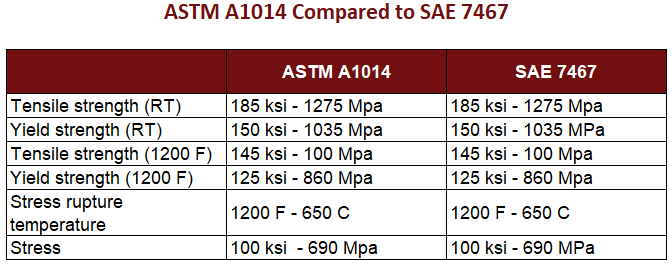 Q: What is the difference between screws made to ASTM A1014 and SAE AS7467? A: When it comes to the material characteristics there is not much difference in these specifications. Both standards describe bolts and screws made from Inconel 718 (UNS N07718) material equivalent to the European 2.4668 material norm. These both …
Q: What is the difference between screws made to ASTM A1014 and SAE AS7467? A: When it comes to the material characteristics there is not much difference in these specifications. Both standards describe bolts and screws made from Inconel 718 (UNS N07718) material equivalent to the European 2.4668 material norm. These both …  Q: Is Monel stronger than stainless steel? A: In terms of strength, there are many grades of steel and stainless steel. Some of them are even cold-worked for added strength. So to compare Monel to “steel” would be a very broad question – and difficult to answer without knowing the …
Q: Is Monel stronger than stainless steel? A: In terms of strength, there are many grades of steel and stainless steel. Some of them are even cold-worked for added strength. So to compare Monel to “steel” would be a very broad question – and difficult to answer without knowing the …  Q: Is Monel better than titanium? A: Monel bolts and Titanium bolts have both similarities and differences. Both materials offer excellent resistance to saltwater. The only difference would be that Titanium has a slight advantage in stagnant seawater which can cause some corrosion to Monel. Both are the top materials …
Q: Is Monel better than titanium? A: Monel bolts and Titanium bolts have both similarities and differences. Both materials offer excellent resistance to saltwater. The only difference would be that Titanium has a slight advantage in stagnant seawater which can cause some corrosion to Monel. Both are the top materials … 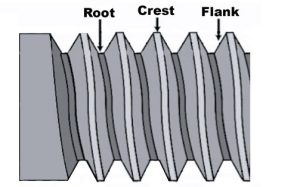 Q: What is the difference between UNC and UNRC Threads? A: An “R” pitch can apply to UNRF (unified rounded fine thread) and UNRC (unified rounded coarse thread). The only difference between UNC threads and UNRC threads (or UNF and UNRF threads) is that the root of the thread – …
Q: What is the difference between UNC and UNRC Threads? A: An “R” pitch can apply to UNRF (unified rounded fine thread) and UNRC (unified rounded coarse thread). The only difference between UNC threads and UNRC threads (or UNF and UNRF threads) is that the root of the thread – … 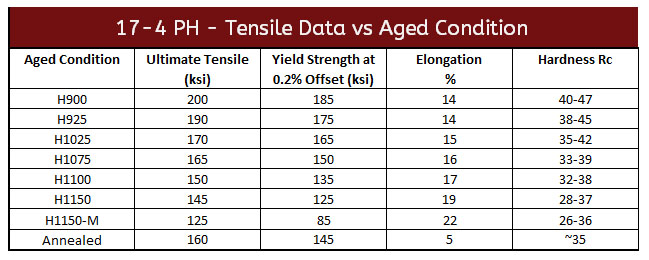 Q: I have a customer asking me for 17-4PH stainless, but says they need it heat treated to H1100. What does this mean? A: 17-4PH bolts are available in many different heat treatment options. This means that different heat treatments such as H1150, H1100, H1075, etc are applied to the …
Q: I have a customer asking me for 17-4PH stainless, but says they need it heat treated to H1100. What does this mean? A: 17-4PH bolts are available in many different heat treatment options. This means that different heat treatments such as H1150, H1100, H1075, etc are applied to the … 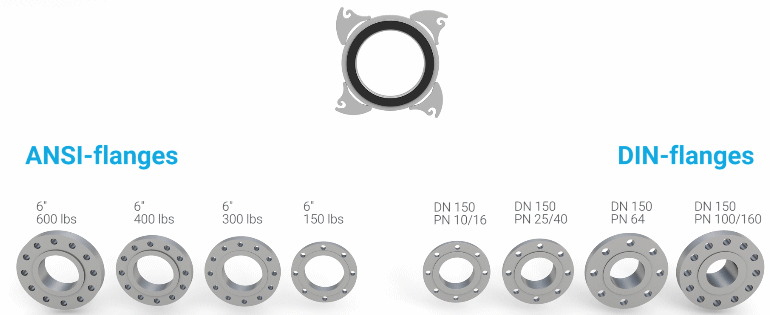 Q: What is the Vario gasket design? A: Vario is not a unique gasket at all, it is an adder to the existing JP/JG Revoseal gaskets to add in centering the gasket no matter what pressure class flange that the gasket is being mated to. This save metal costs as …
Q: What is the Vario gasket design? A: Vario is not a unique gasket at all, it is an adder to the existing JP/JG Revoseal gaskets to add in centering the gasket no matter what pressure class flange that the gasket is being mated to. This save metal costs as … 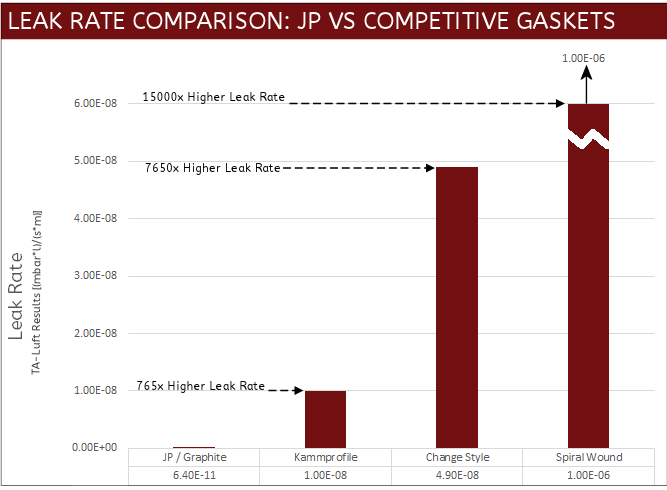 Q: How do the Revoseal gaskets compare in terms of leak rate to a spiral wound or kammprofile style? A: The Revoseal gaskets perform hundreds to thousands of times better than these types of gaskets. Kammprofile gaskets leak 765 times MORE than a Revoseal gasket and spiral wound gaskets leak …
Q: How do the Revoseal gaskets compare in terms of leak rate to a spiral wound or kammprofile style? A: The Revoseal gaskets perform hundreds to thousands of times better than these types of gaskets. Kammprofile gaskets leak 765 times MORE than a Revoseal gasket and spiral wound gaskets leak …  Q: I need a high temperature gasket that can provide a tight seal to a hazardous application that reaches temps of about 1200F. Do you have a product that can help me? A: Yes. An Inconel JG / JP gasket can give you high temperature resistance at these temperatures. The …
Q: I need a high temperature gasket that can provide a tight seal to a hazardous application that reaches temps of about 1200F. Do you have a product that can help me? A: Yes. An Inconel JG / JP gasket can give you high temperature resistance at these temperatures. The … 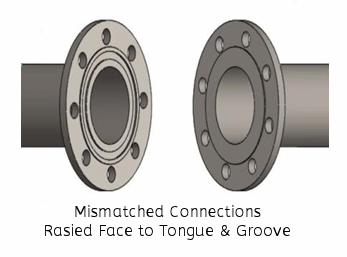 Q: I need a gasket for dissimilar flange faces with an 8mm gap. Is there a solution you can provide to fit this issue? A: Yes. We can produce custom JG / JP gaskets that fit dissimilar flange faces for a tight seal. JG / JP gaskets could be made …
Q: I need a gasket for dissimilar flange faces with an 8mm gap. Is there a solution you can provide to fit this issue? A: Yes. We can produce custom JG / JP gaskets that fit dissimilar flange faces for a tight seal. JG / JP gaskets could be made … 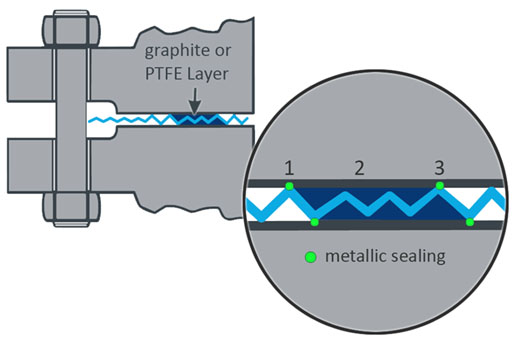 Q: I have a leaking gasket that is in a heat transfer fluid application. What do you recommend? A: For this situation you may want to try the Revolution gasket system. Due to consistent sealing pressure it will offer you a far lower leak rate than an off the shelf …
Q: I have a leaking gasket that is in a heat transfer fluid application. What do you recommend? A: For this situation you may want to try the Revolution gasket system. Due to consistent sealing pressure it will offer you a far lower leak rate than an off the shelf … 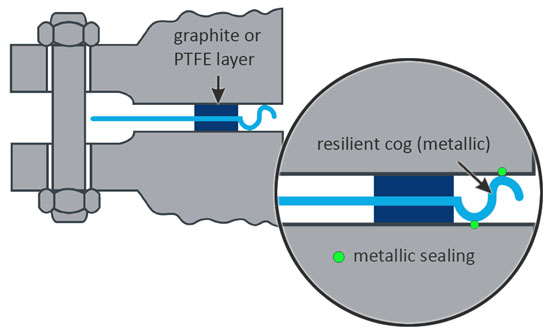 Q: I have a high pressure steam application that is affected by a lot of hammering (pressure fluctuations). What gasket design can I use to prevent leakage? A: For this application I would recommend the Revoseal Eco+. Not only does this gasket offer 1000x better sealing than graphite gaskets, its …
Q: I have a high pressure steam application that is affected by a lot of hammering (pressure fluctuations). What gasket design can I use to prevent leakage? A: For this application I would recommend the Revoseal Eco+. Not only does this gasket offer 1000x better sealing than graphite gaskets, its … 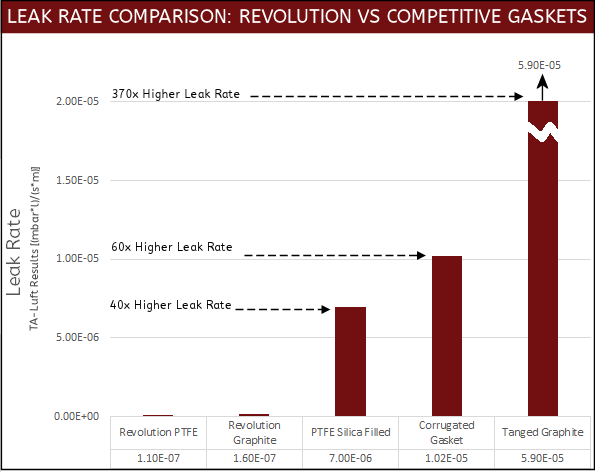 Q: I need a high temperature gasket that would be able to handle thermal cycling. Any ideas? A: The Revolution gasket is ideal for thermal cycling. The design of the gasket accommodates flange movement that can be caused by thermal cycling and vibration. The corrugated design of the Revolution gasket …
Q: I need a high temperature gasket that would be able to handle thermal cycling. Any ideas? A: The Revolution gasket is ideal for thermal cycling. The design of the gasket accommodates flange movement that can be caused by thermal cycling and vibration. The corrugated design of the Revolution gasket … 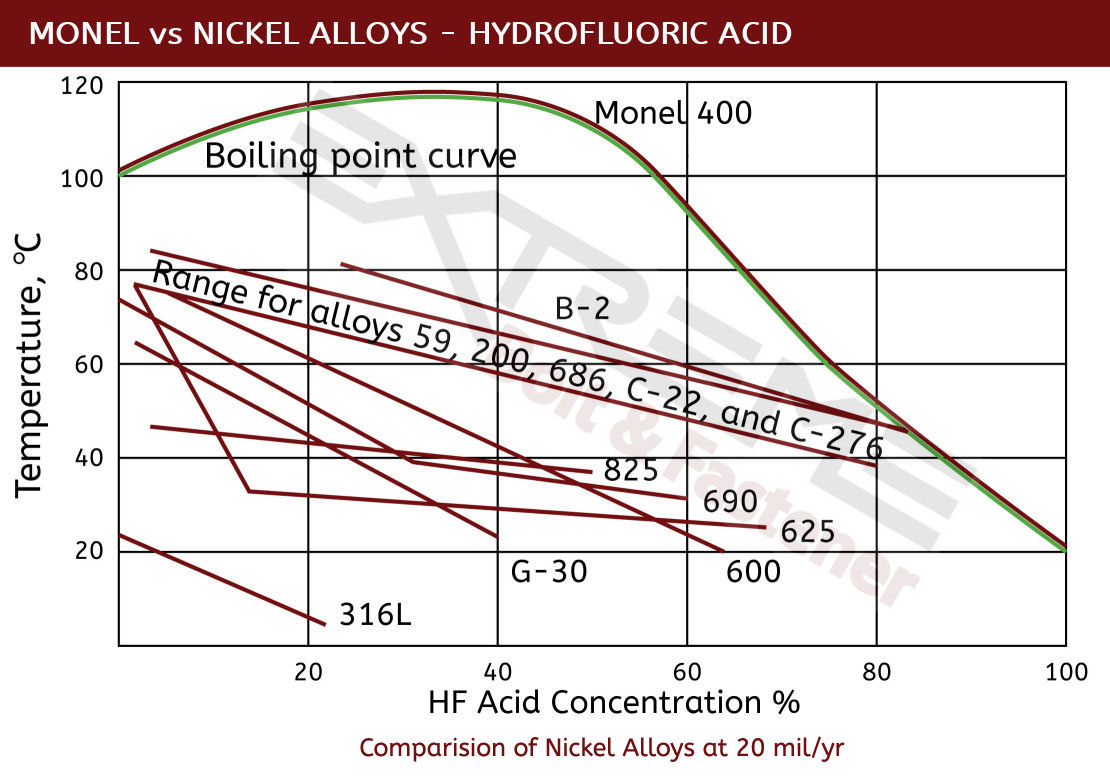 Q: Will Nickel 200 bolts be a good choice for hydrofluoric acid? A: For aqueous HF, Nickel 200 fasteners offer limited protection. If application requires a metal then you may want to consider Monel 400. Monel 400 bolts are the most resistant option for hydrofluoric acid in all concentrations up …
Q: Will Nickel 200 bolts be a good choice for hydrofluoric acid? A: For aqueous HF, Nickel 200 fasteners offer limited protection. If application requires a metal then you may want to consider Monel 400. Monel 400 bolts are the most resistant option for hydrofluoric acid in all concentrations up …  Q: I’m operating a FGD (Flue Gas Desulphurization) plant and am experiencing some mild corrosion on my scrubber bolting. I’m currently using Incoloy 825 bolts. It’s mild corrosion but non-the-less I’d like to have it cleared up before I get additional issues. Any suggestions? A: Since scrubber liquids and gases …
Q: I’m operating a FGD (Flue Gas Desulphurization) plant and am experiencing some mild corrosion on my scrubber bolting. I’m currently using Incoloy 825 bolts. It’s mild corrosion but non-the-less I’d like to have it cleared up before I get additional issues. Any suggestions? A: Since scrubber liquids and gases … 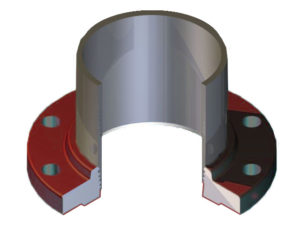 Q: When do you recommend to use a threaded flange? I need a flange that can be changed easily & frequently. A: After speaking with the customer, I found out that he has a pilot plant where he will be frequently changing parts. In this case a threaded flange is …
Q: When do you recommend to use a threaded flange? I need a flange that can be changed easily & frequently. A: After speaking with the customer, I found out that he has a pilot plant where he will be frequently changing parts. In this case a threaded flange is … 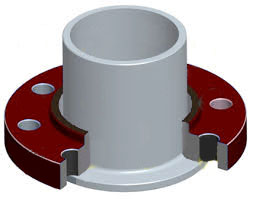 Q: When is it best to use a lap joint flange? A: Lap joint flanges are good for very expensive materials like tantalum and zirconium and other specialty alloys like Hastelloy or Inconel due to reduced cost of sleeve vs solid flange. Lap joint flanges are unique in that they …
Q: When is it best to use a lap joint flange? A: Lap joint flanges are good for very expensive materials like tantalum and zirconium and other specialty alloys like Hastelloy or Inconel due to reduced cost of sleeve vs solid flange. Lap joint flanges are unique in that they …